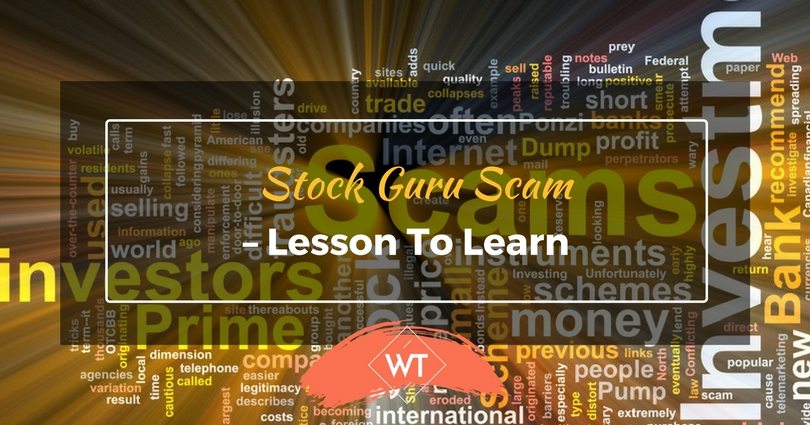Stock Guru Scam – Lesson to Learn

Stock scams- Don’t fall for easy money – Be financially intelligent. All said and done there is no easy money in the real world. If you are financially intelligent you will never fall for these scams or traps. Stock scams work by appealing to investors’ greed.
We hear of dozens of news on stock scams and fraudulent schemes in the news, however, the systems required to prevent such frauds are inadequate in India. On the other hand the punishment or justice is invariably delayed or denied particularly when the criminals have influence and money.
In the Finance world there are many scam architects who offer get-rich-quick schemes promising extra-ordinary returns that are too good to be true.
A recent one is the “Stock Guru” scam which made headlines all around India. Lets understand how it happened and what you can do to stay away from such schemes.
About The Stock Scams
According to media reports and public information Ulhas Prabhakar Khare and Raksha J Urs are the main architects of this who were involved in various scams and fraud operations earlier.
They ran a film institute which promised 100% placement. The couple collected fees and vanished all of a sudden. The couple has been running many business ventures in various cities to dupe investors, customers, etc.
In Ratnagiri, a small town in Maharashtra the couple was living under the false names Sidhharth Jay Marathe and Maya Marathe, along with their three children.
Later the couple had floated Stock Guru in 2010 under the false identity of Loskeshwar Dev and Priyanka Saraswat Dev. The stock guru scheme promised investors extraordinary returns of 20% per month, which attracted several investors. About 2 lakh investors lost about Rs.1,100 Crore in the scheme.
The Bait & The Modus Operandi – Stock Scams
What attracted so many people to this scheme? The promoters promised 20% return per month, which enticed many people to put their hard-earned money. Secondly, the company also paid 20% returns every month for 6 months, and in the seventh the principal amount was also repaid.
Wow! Cool! Good Deal! This is what most people thought and rushed to invest more money. What happened next? The same cycle continued and more and more people started investing in this scheme. How this works is simple.
The scam company collects money from new investors and pays the old ones (basically re-cycling of money). When someone makes superb returns he/she obviously recommends to others like friends, family, etc.
The new investors who want to capitalize this opportunity will invest more. Why? The scam company will tell them that the offer is for a limited period, enticing investors to invest more at one go.
At some stage people will start investing lakhs of rupees, and the total funds would run in to crores. At this time the scamster will become more alert on his next plan (to vanish). Obviously now the company cannot pay back 20% interest every month for a long period – its practically impossible.
So once they see a sign of danger they will pack up and fly or abscond overnight. That’s how the term “Fly By Night” operators was used to describe the operators of such scams.
Real Stories of Stock Guru Victims
The poor and financially illiterate were the targets of this scheme initially, but later it spread to the educated and business-savvy people too. Sandeep Sharma, a high-school dropout seems to have lost Rs.1.25 crore in the scam.
With such amounts, one could stop working and be financially independent till your last days. But for this person it was life-time earnings lost in one go.
Delhi-based businessman Ankur Sachdeva, was equally victimized and lost Rs.11.6 lakh. How could a shrewd businessman be fooled? Ankur admits being blinded by 20% returns per month. Though it was unbelievable initially he and several others were blinded by the high returns.
When the company paid 20% per month as promised for six months and also returned the original principal in the seventh month, the confidence and belief increased manifold. However, Ankur did the right job of spearheading efforts all victims to bring the Stock Guru promoters to justice.
How the Gurus got trapped?
After being duped, some people had approached the police and lodged complaints. Some investors formed a group on Facebook page to highlight their plight. This online movement also increased media visibility and news spread across prompting the police and authorities to act faster.
Recently (in November 2012) the police have arrested the couple and recovered drafts worth close to Rs.20 crore as well as a plot of land. Further, high-value watches and seven vehicles were seized. The legal process is continuing, but the recovery is only a small portion of the Rs.1100 crore lost.
How to protect yourself from such Stock Scams?
Stay away from unorganized/unregulated investment schemes
There are several investment schemes which are not regulated by RBI, SEBI or IRDA. Read the fine print and do some verification or due diligence before you commit money. Don’t touch schemes which are not approved by relevant authorities in India.
Don’t believe in hearsay – check news or reviews
Most of these malicious schemes are spread by hearsay or word-of-mouth publicity. You will not find a website, a scheme information document or a registration with relevant authorities. If you look at standard financial or investment products, these will be reviewed on newspapers, internet, etc.
Check for addition information or reviews online to be double sure. Even for genuine products you will find good or bad reviews, but for fraudulent products the reviews will clearly tell you to stay away.
Exponential Returns are false
If someone promises that an investment provides 15-20% returns per annum its believable. However, anything in the 20-30% range should be seen as seasonal returns in a good bullish market (favorable circumstances).
Remember that providing consistent returns of above 25% p.a. is not easy unless you are in to a business where the profit margins are excellent and the product is in perennial demand and where there is little or no competition.
Sounds like “Too good to be true” Right? Yes that exactly the point on how Stock Guru made 20% returns per month. If we take a simple interest it translates in to 240% per year, which means you are more than tripling your money within a year, which cannot be true.
Remember that no one can consistently make 25% every year for a long time. So when someone promises more than this either its for a short while or it’s a clear scam waiting to become a bubble and burst someday.
Stay away from secret schemes with poor disclosures
Most fraudsters will not tell you clearly how the funds are going to be utilized or invested. In some cases they might tell you they invest in stocks, real estate or say in some projects. But they will never disclose or provide statements or status updates on what is happening to your investment.
In Stock Guru case investors were happy as long as they received 20% return. They never bothered to check how this return was made. Its like a typical Ponzi scheme where the new investors bring in money, which is diverted to old investors and the cycle runs as long as there are new fools to put in money.
Once the cycle matures or stops, the scamster disappears. So try to stay away from schemes which don’t have transparent disclosures or don’t provide updates.
Losing Opportunity is better than losing your capital
Most fraudulent schemes say that the opportunity is a special limited-time offer as if they are “once in a lifetime” options which few people have access to. This is all crap.Instead this is an nice trick to force you to take a quick decision. If you don’t invest your opportunity loss will be 20% p.a., but if you put in all your hard-earned money in to this your capital may not come back.
Remember that “Return of Investment” is more important than “Return on Investment”.
Betting vs. Investing
There are numerous betting schemes around where the results are based on luck. Avoid such options at all costs. Investing is a genuine and legal way of putting your money to good use, whereas betting/gambling is illegal in some cases and not a professional way of utilizing your savings.
Hot Tips, SMS, etc.
Its become fashionable for many trading advisers (both genuine and fraudsters) to provide tips on SMES, email, etc. Generally their ads say “3 trading tips daily for Rs.2000 per month” or “2 multibaggers every month at Rs.Xxxx”.
Awards/Phishing Emails
I’m sure you have received these emails sometime in the past. It typically goes like this “Claim your $100,000,000 award from Coca Cola”. In some cases the email sender pretends to be your banker and asks for your internet banking user ID and password.
Once you provide this information they can access your account and misuse it to withdraw funds. Don’t pay attention to such mails. Just delete them or mark them as “Spam”. Never give your personal information to unknown people online.
Don’t fall for Easy Money – Be Financially Intelligent
Stock scams are very prevalent in modern times. Don’t believe if someone who claims to offer 10% return every month. If your friend/relative/acquaintance has put money in such schemes please warn them about the consequences.
If you are financially intelligent you will never fall for these stock scams or traps.
How to become financially intelligent? Should you start learning about Finance? No, not really – just invest some time in learning about the products you are investing in.
When you buy a television, mobile phone or a laptop, you spend sometime to read the manual, instructions and learn how to use it, right? In the same way when you invest in stocks, mutual funds, fixed deposits, ETFs, etc. invest some time to learn the feature of the product and see how it fits your needs. This is the way you become financially intelligent.
If you haven’t started, please make a good beginning in 2013 to become Financially Intelligent. You will find this investment highly rewarding and beneficial over the long run.








Leave a Reply